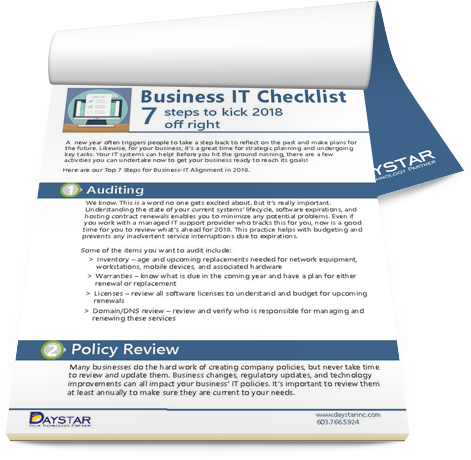Are you struggling with frequent IT issues that disrupt your business operations? Do you find it challenging to keep up with the ever-evolving technology landscape?
Many businesses face these pain points, resulting in lost productivity, increased costs, and frustrated employees. This is where managed IT services come to the rescue.
It encompasses a holistic approach to IT management that aligns with your business goals. This means you get access to advanced technologies and skilled professionals without the need for significant capital investment. This is precisely why 73% of companies have implemented managed IT services in some capacity.
|
As Keith Bamford, CEO of Daystar says, "Managed IT services providers act as strategic partners, enabling your business to scale and succeed." |
This comprehensive guide helps you understand how managed services can streamline IT operations, enhance efficiency, and support your business growth.
What Are Managed IT Services?
Managed IT services involve outsourcing various IT functions to a third-party provider, known as a managed service provider (MSP). This approach is becoming increasingly popular, with the global market expected to grow significantly—from $283.90 billion in 2023 to $671.14 billion by 2030.
At its core, the managed IT services definition involves a contractual agreement between a business and an MSP. This agreement, often detailed in a service level agreement (SLA), outlines the specific services to be provided, the expected level of service, and the metrics for performance evaluation. This agreement may or may not be binding depending on the MSP.
Let's take the example of XYZ Corporation, a medium-sized business facing frequent IT challenges. Their internal IT team was overwhelmed with daily support requests and struggling to keep up with the latest technology trends. By partnering with an MSP, XYZ Corporation was able to offload routine IT tasks and focus on strategic projects.
The MSP provided 24/7 network monitoring, proactive maintenance, and comprehensive cybersecurity measures. As a result, XYZ Corporation experienced a 30% reduction in IT-related issues and a 20% increase in employee productivity.
What Is an IT Managed Services Provider?
An IT Managed Services Provider (MSP) is a company that delivers managed IT services to businesses. MSPs are equipped with a team of experts who specialize in various aspects of IT, from cybersecurity to cloud computing. They work closely with clients to understand their unique needs and provide tailored solutions that enhance operational efficiency, reduce costs, and improve overall IT performance.
Constant IT Fires Burning Your Productivity?
Daystar offers comprehensive support to keep your systems running smoothly and efficiently.
Get Reliable IT Support
Managed IT Services Meaning
To fully understand the managed IT services meaning, it’s essential to look at the various components these services include:
- Infrastructure Management: This involves the maintenance and monitoring of a company’s IT infrastructure, including servers, networks, and data centers. The goal is to ensure optimal performance and minimal downtime.
- Technical Support: Managed IT services offer comprehensive technical support, helping businesses resolve IT issues quickly and efficiently. This includes helpdesk support, remote troubleshooting, and on-site assistance when necessary.
- Service Level Agreements (SLAs): A key aspect of managed IT services is the service level agreement. SLAs outline the level of service the MSP will provide, and can include response times, resolution times, and overall performance metrics. These agreements ensure that businesses receive the support they need to achieve their business goals.

Source: CompTIA
How Managed Services Work
Understanding how managed services work is crucial for businesses considering this option. When a company partners with a managed service provider (MSP), the MSP takes on the responsibility of managing and supporting the company’s IT systems. This process typically involves:
-
Assessment and Planning: The MSP conducts an initial assessment of the company’s IT infrastructure to identify areas for improvement. Based on this assessment, they develop a customized plan to address the company’s specific needs.
-
Implementation: The MSP implements the necessary changes to optimize the company’s IT systems. This may involve installing new hardware, updating software, and configuring network settings.
-
Ongoing Management: Once the initial implementation is complete, the MSP provides ongoing management and support services. This includes regular maintenance, monitoring, and troubleshooting to ensure the company’s IT systems continue to operate smoothly.
-
Proactive Approach: A key benefit of managed IT services is the proactive approach to IT management. MSPs use advanced tools and technologies to monitor the company’s IT systems in real-time, identifying and addressing potential issues before they can cause significant disruptions.
Benefits of Managed IT Services
Partnering with a managed service provider offers numerous benefits for businesses, including:
- Cost Savings: Research shows using managed services can cut IT expenses by 25 to 45% and boost how well operations run by 45 to 65%. By outsourcing IT functions to an MSP, businesses can reduce costs associated with hiring and training in-house IT staff. Additionally, MSPs often provide services on a subscription basis, making it easier for businesses to budget for IT expenses.
- Improved Security: Cybersecurity is a significant concern for businesses today. Managed IT services include robust security measures to protect company data and systems from cyber threats. This includes regular security assessments and the implementation of advanced security protocols.
- Business Continuity: Managed IT services help ensure business continuity by minimizing downtime and quickly resolving IT issues. This is crucial for maintaining productivity and avoiding the financial losses associated with extended outages.
- Scalability: As businesses grow, their IT needs evolve. Managed IT services provide the scalability necessary to support this growth. MSPs can quickly adjust their services to accommodate changes in the company’s IT requirements, ensuring seamless operations.
- Access to Expertise: MSPs employ highly skilled IT professionals with expertise in various areas of information technology. This allows businesses to access a level of expertise that may be difficult to achieve with an in-house IT team.
Types of Managed IT Services
Managed IT services encompass a broad range of services designed to meet the diverse needs of businesses. Some of the most common types of managed IT services include:
|
Service |
Description |
Key Benefits |
|
Data Backup and Recovery |
Ensures regular backups and quick recovery of lost data. |
Minimizes downtime and data loss. |
|
Software Updates and Patching |
Regular updates and patches to keep software secure and up-to-date. |
Enhances security and performance. |
|
IT Consulting and Strategy |
Provides strategic advice to align IT with business goals. |
Supports long-term business planning. |
|
Vendor Management |
Manages relationships with IT vendors and service providers. |
Streamlines procurement and support. |
|
Compliance Management |
Ensures IT practices meet industry regulations and standards. |
Reduces risk of legal and compliance issues. |
|
Virtual CIO (vCIO) Services |
Offers executive-level IT strategy and oversight. |
Guides IT decision-making and investment. |
|
Remote Workforce Solutions |
Supports remote work infrastructure and security. |
Enables secure and efficient remote work. |
|
Disaster Recovery Planning |
Develops and implements disaster recovery plans. |
Ensures business continuity. |
|
Network Monitoring and Management |
Continuous monitoring and management of network infrastructure. |
Enhances network performance and reliability. |
|
Cloud Computing Services |
Manages cloud infrastructure and services. |
Facilitates scalability and flexibility. |
|
Software and Hardware Management |
Manages the lifecycle of software and hardware assets. |
Optimizes resource utilization and reduces costs. |
Experience Superior IT Management with Daystar
Managed IT services are a vital resource for businesses looking to streamline their IT operations, enhance security, and achieve cost savings.
|
Discover Trusted Managed IT Services Near You: |
By partnering with a reliable MSP like Daystar, companies can focus on their core business activities while benefiting from a proactive approach to IT management.
If you’re ready to take your IT infrastructure to the next level, consider scheduling a free consultation with Daystar.
Our team of experts is dedicated to helping you achieve your business goals with tailored IT solutions. Contact us today to get started and experience the Daystar difference!












